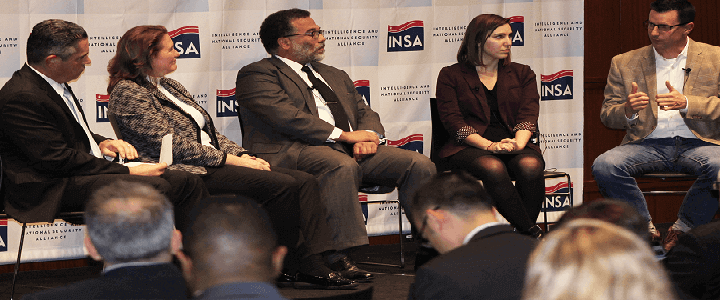Earlier this week, Intelligence and National Security Alliance (INSA) gathered a panel of experts to discuss the topic: “Serving Your Country in National Security: Mindsets and Skillsets for Success” (you can watch the full discussion here).This event is part of INSA’s ongoing work to encourage dialogue and continuing education within the national security field.
The panel spoke to a diverse audience—ranging from students to seasoned members of the intelligence community. Throughout the panel discussion and Q&A session, panelists and audience members identified some common misconceptions about what it takes to be successful in national security:
Myth 1: My work speaks for itself. I don’t need to play internal politics to move up the ladder.
Harry Coker, Executive Director, NSA, said this was his mentality in the early years of his career. What he didn’t realize was that, by “keeping his head down,” he was missing opportunities to earn the trust of his colleagues and understand his work environment. You can risk becoming oblivious to your teammates—or your teammates becoming oblivious to you.
He explained, “Folks need to know you for the right reasons. People are making decisions about you without your knowing.” Having good situational awareness and developing “soft skills”—like relationship-building and communication—are as essential as producing excellent work.
Myth 2: I have to be a tech/data genius to be marketable.
John Goolgasian has had a varied career with both government agencies and industry partners. But despite being a tech genius himself, Goolgasian says that’s not the bottom line. In his experience, the “unicorns” are people who are tech-literate, but can effectively bridge the gap between tech experts and the average person. The real key to success is being able to ask the right questions of data experts, interpret data for regular folks and then turn that data into actionable solutions.
So while being skilled with data is certainly an asset, being able to take that information and apply it to real-world problems is the magical combination.
Myth 3: I need to know exactly which position I want and which agency I want to work at.
While knowing your strengths is always important, a flexible outlook can mean the difference between a truly satisfying career and a job that looks better on paper than it does in reality.
Mandy Misko, an intelligence officer at Financial Services-Information Sharing & Analysis Center (FS-ISAC), reminded the audience that the most important part of working in the intelligence community is the mission. When she was first approached about working in cybersecurity, she felt the specialty was totally outside her area of expertise; she didn’t have a technical background. But as it turns out, being able to grasp technology while being an excellent writer and communicator has been a winning combination—both for her and for her agency.
With a lengthy, arduous application process and shifting needs, being willing to serve the mission in an unexpected role can open the door for continued opportunities to learn and to advance in your career.
Myth 4: The intelligence community is a “boy’s club.” Women can’t rise to leadership positions.
This may come as no surprise to some readers, but this simply is not the case. While the intelligence community was led predominantly by males for decades, the last generation has seen a great shift.
Maja Lehnus has had a 37-year career with CIA, spending over 30 years as an expert on WMDs. The role of women has been progressively greater in the decades since she began her career. The CIA now has an almost 50/50 ratio of men to women on its staff—many, like Lehnus, who are in positions of leadership. Now, in her role as Director of the agency’s Talent Center of Excellence, she oversees recruitment for the entire agency.
While the makeup of every agency, department and organization will always vary, the national security community is more fully utilizing the strengths of all Americans who are working to keep our country safe.



